This day was the most fun yet!
It started with a strategy meeting with our contractor, Gaudencia. We've all realized that we need a new plan for finishing the building. Hard as we all try, we just can't seem to get the momentum going that we need to reach completion. There have been all the usual construction difficulties, including supply shortages and unreliable workers, but probably the biggest difficulty is attempting to do such a big project from more than ten thousand miles away. The job is 16 months behind schedule with no end in sight. We knew we had to do something.
The stroke of genius struck Jen. "We need to put Friday in charge of the site." Of course! When we were here in July we offered him the job of overseeing the roof project. We told him we needed 19 roofs completed by the time the rains started. "Can you do it?" we asked. Smiling his shy, modest Friday smile he nodded and said, "Yes, I can do it." Read about Friday hiring the first of his team back on July 17, 2008.
He was true to his word. His little team of organized, well-trained, hard-working Living Compassion carpenters completed the task in plenty of time for families to get moved in before the first drops fell. We need that commitment and focus again.
We called Friday and asked him to come to Castle Lodge for a short meeting. While holding our breath we made our proposal! If he said no we were out of options. We would have no choice but to limp along until the time--some day--when the building would be ready for the people to use.
"Yes, I will do it." We cheered! A much more confident Friday began to explain exactly what he would need to be successful. We agreed with his every point and told him we would arrange to meet with him and Gaudencia before leaving.
Our next stop was out in Kantolomba to meet with the ladies, in response to information from Theresa that some issues had arisen they wanted to discuss with us. The first item on the agenda was maternity leave. A lot of babies are born in Kantolomba, and in any given month at least one of our ladies is pregnant. They stop work about two weeks before delivery and take the rest of their three-month leave after the baby arrives. Currently they receive full pay for those three months. The difficulty is that the remaining team members have to carry the load for the missing woman, getting the same pay she's getting for not working, and resentment is building. What to do? If the women receive nothing for those three months the family won't survive, but the situation feels particularly unfair to the women past child-bearing years who are always working while others come and go with some regularity.
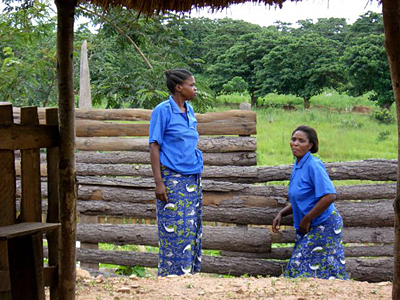
We met in the insaka. We play a little game where we silently quiz ourselves on the women's names as we see them. We know all of them but are sometimes hard-pressed to come up with it on the spot. Greeting them as they walked into the meeting one-by-one was a great test. First was Mabel and Martha.
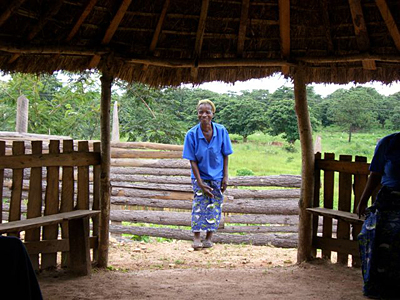
Then Anne.
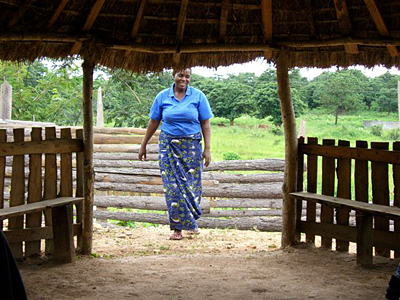
Next Georgina.
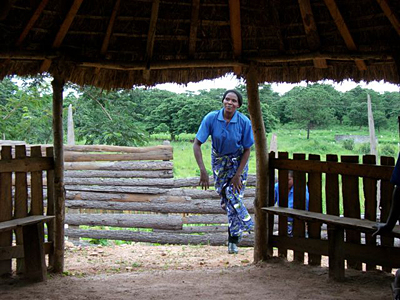
And Ethel
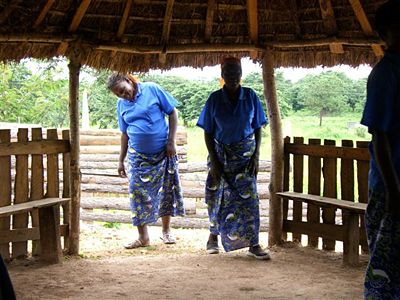
Then Violet and Veronica.
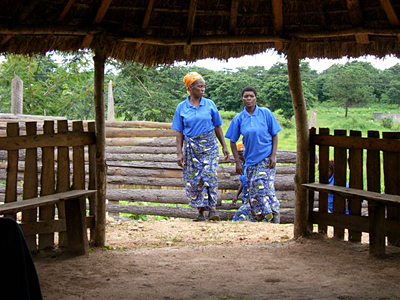
Christine and Pauline
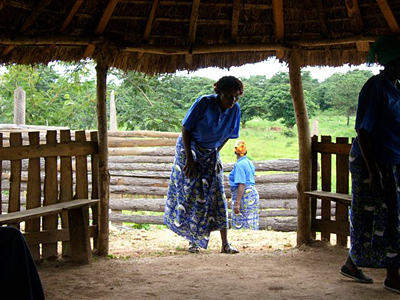
Eugenia
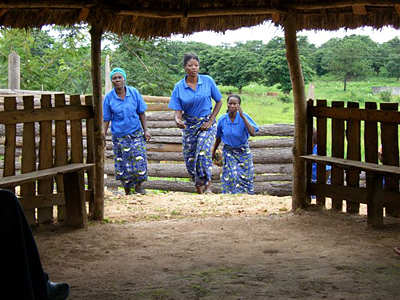
Nellie (middle), Angela (left) and Sophiya (right).
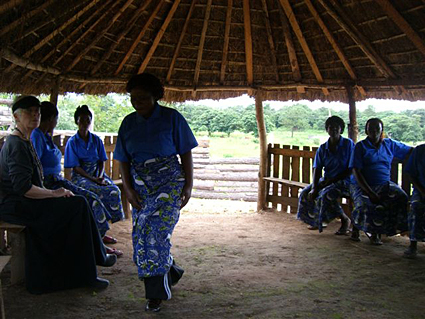
Brenda finding a seat.
We asked the ladies how they would like to solve the problem. A lively discussion ensued during which Cheri and Jen regularly requested a time-out for translation. Here's what they came to: The pregnant woman would receive full pay for the first month of her leave and half pay for the next two months. The consensus was that the family would be able to budget during the first part of the pregnancy in order to have reserves in place to tide them over through the lean months. The next part brought applause and whoops from certain older members: the money from the two months of half-pay will go into a fund to provide a bonus for those who work the full year with no leave. Everyone seemed quite pleased with the solution.
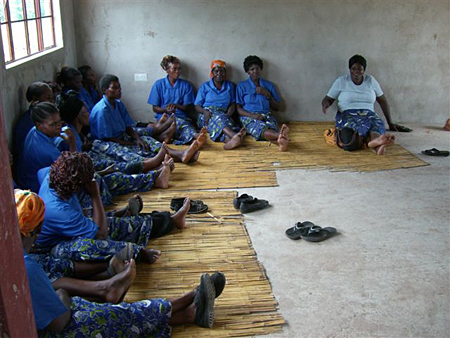
We paused the meeting for a moment to move from the insaka to inside the new building--too many mosquitoes!
We then asked to hear from them what they see as next steps. Everything is moving along very well with the school and lunch program, the new tuck shop, the garden, the water distribution--where shall we go from here? What do you want to do next? Everyone got very quiet. What's going on, we ask. Theresa tells us the women want us to tell them what to do next. They all giggle as we make it clear that's not how it's going to go. "This is your organization, your cooperative, your community, your projects and you must decide for yourselves," we told them. They immediately got down to work. It was great fun to watch them go through the process, even though we had no idea what they were saying. Periodically we'd get a translation so we kept up fairly well.
They want a hammer mill. Maize, mealy meal, nchima, is what they eat. At this time of year the whole countryside is cornfields. There's nowhere in the area to grind the corn into nchima so people must walk long distances with heavy sacks of kernels on their heads to find a place to turn their maize into mealy meal. Kantolomba is centrally located, and the women are convinced they will do very well with a hammer mill business. Their plan is use the kwacha they get from the water, the tuck shop, and the tiny school fees to finance the purchase of their mill. We let them know that if they come up with the down payment, we will seek a micro-finance loan to cover the rest. They will then be able to make larger payments as the mill is put to work.
What else, we ask? They glance at one another shyly. Christine spoke up. "If we had a piece of land where we could grow the corn ourselves, we wouldn't need to buy any more sacks of nshima." Big enthusiasm for this suggestion! "But where could we get that much land?" we ask. Regina raises her hand and tells everyone about a section of land she just across the stream that's for sale. "How much?" we ask. Regina figures we could get it for 6 million kwacha, about $1200. When we try to find out how large the parcel of land is, the communication breaks down. It is either the size of the property we now own, or it runs the length of Kantolomba. Either way, it is plenty of land for our purposes.
Now it's the men's turn. What is their vision? Two ideas emerge: 1) to build small household items that people need and can afford. This idea was very enthusiastically received. And, 2) purchase a Hydraform machine to make sturdy bricks for building.
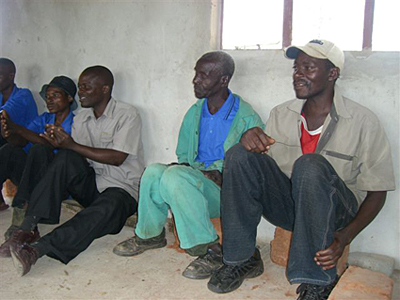
The men's team
The rest of the meeting was devoted to finances. How would the loans be set up, what would be the structure for repaying, how soon might we be able to get started, and so forth. The amazing, miraculous, and deeply gratifying piece of this for the two musungus on the sidelines was that this conversation was not that different from the very first conversations we had with these folks. They want to do much the same things they wanted to do then. But the difference, the enormous, life-changing difference, is that they're now ready to do it--for themselves!
